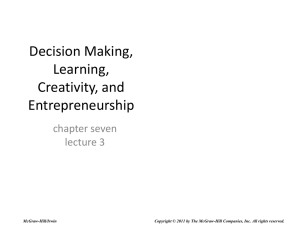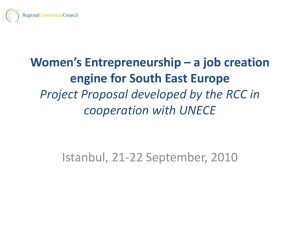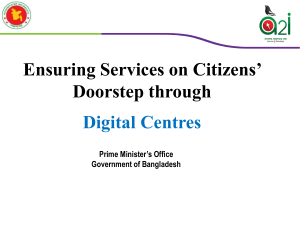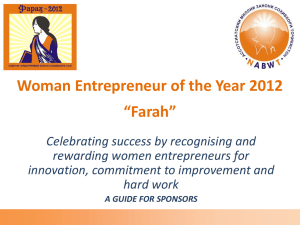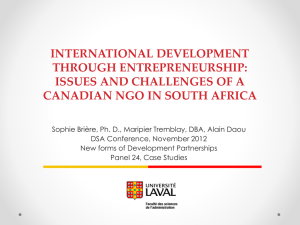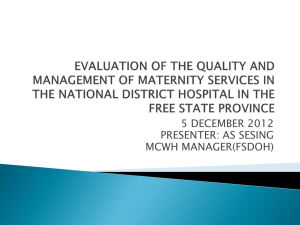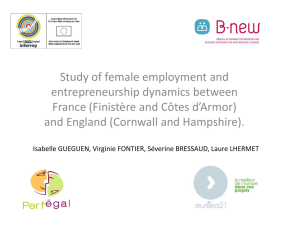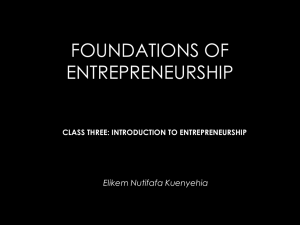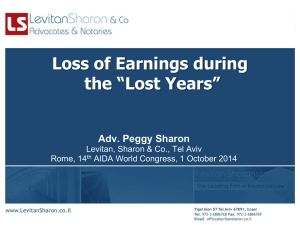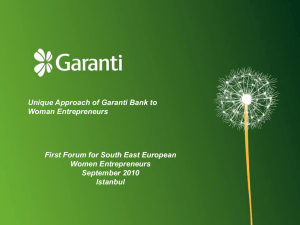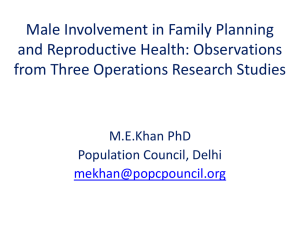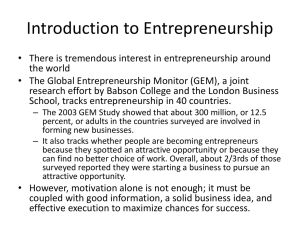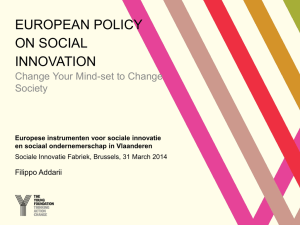How Gender Affects Life Course Pathways to Entrepreneurship
advertisement
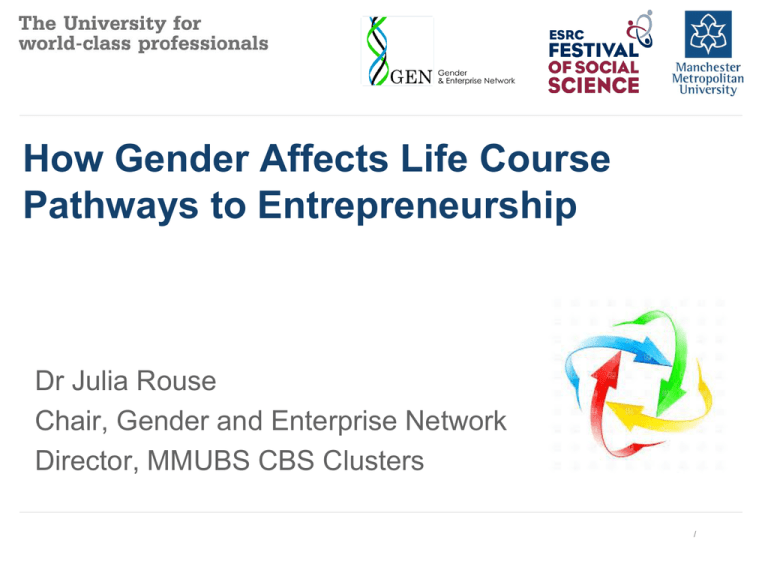
How Gender Affects Life Course Pathways to Entrepreneurship Dr Julia Rouse Chair, Gender and Enterprise Network Director, MMUBS CBS Clusters / Today: Engaged Scholarship • Putting academic research evidence and argument alongside practice based knowledge • Making sense together of ‘wicked’ social problems • Feminist organising / “The scholarship of engagement means connecting the rich resources of the university to our most pressing social, civic and ethical problems. . . . I have this growing conviction that what’s also needed is not just more programs, but a larger purpose, a sense of mission, a larger clarity of direction” —Ernest Boyer, Scholarship Reconsidered: Priorities of the Professoriate Self-Employment in the UK (ONS, 2014) • At a 40 year peak (4.6m; 15% of main jobs) – Particular growth in older workers and women (up 34% but still only 1/3 of the self-employed) • During/post-recession – Most employment growth = self-employment – Exit rate after 5 years : 32-37% down to 23% – Earnings declined by 22% • Most common occupations: builders, taxis, joiners – For women: domestics, childminders, hairdressers My Concerns: • How does entrepreneurship (informal trade, selfemployment, small business owner-management) fit into families, life courses and communities? • How can entrepreneurship be a route of social mobility (or at least stability)? – Overcoming gender, class, ethnicity structures? • How can we innovate? Key elements of my work: • Longitudinal analysis of enterprise programmes Critique of ‘enterprise inclusion’ policy Critique of welfare/childcare policies • Statistical modelling of life course pathways into entrepreneurship and of entrepreneur earnings • Maternity in small enterprise: for entrepreneurs, employers, employees My collaborators: • Dr Dilani Jayawarna, Professor John Kitching • Dr Allan Macpherson, Dr Natalie Sappleton, Dr Asma Mirza Manchester, Tameside, Salford councils NEA/NES Programme European Social Fund Economic and Social Research Council Leverhulme Trust Oxfam Equality and Human Rights Commission First: what is this process of ‘entrepreneurship’? • Entrepreneurship – the mobilisation of resources in (profitable) market exchange. • Key resources: Financial capital Human capital Social capital Labour capital Contextualising Entrepreneurship in Socially Structured Life Courses Social processes affect an individual’s capacity to accrue and mobilise resources in (competitive) market exchange across 3 intersecting life courses: ► Individual ‘career’ ► Household/family ► Business Intersecting Structuring Forces in Life Courses • Class – the transmission of resources by parents • Gender – socially governed ways of being a wo/man • Ethnicity – social and cultural practices and resources associated with culturally defined groups Entrepreneur Motivations in Early Establishment: Gendering Reluctant entrepreneurs Convenience entrepreneurs Social entrepreneurs Economically driven entrepreneurs Learning and earning entrepreneurs Prestige and control entrepreneurs The Effect of Motivations on Businesses (Female Dominated) Convenience entrepreneurs Low debt/time investment, slow growth Social entrepreneurs Dependence on grants, high time commitment, no/low growth The Effect of Motivations on Businesses (Male Dominated) Economically driven entrepreneurs Relatively high debt/time investment, moderate growth Learning and earning entrepreneurs Balanced investment, high time commitment, niche strategies, high growth Prestige and control entrepreneurs High debt investment, low time commitment, high value strategies, slow growth The Effect of Motivations on Businesses (Female and Male) Reluctant (young) entrepreneurs Low investment, low value strategies, slow/no growth The Effect of Life Course on Start-Up • It’s a class thing: more likely to start-up if: – Your parents had a better job, more wealth, a solid education. – You have a better job, more work experience, higher savings/income. – Your household is wealthy • But poverty encourages some ‘survival self-employment’ A Class Thing Intersected by Gender • Having primary care for childcare makes start-up much less likely. – So middle class women may be deterred from applying their class resources due to their mothering role. – The poor are much more likely to start-up if they can invest long hours due to freedom from childcare. Class Also Affects Entrepreneur Incomes • In businesses that survive ‘birth’: – Year 1: £11,513 (median drawings) + £7200 (median profits) • But there is a concentration of the poor/rich self-employed. • Class is less predictive of earnings v. start-up – But investment still matters – Household wealth supports income growth ..and care responsibilities help cause an Entrepreneur Gender Pay Gap • Longer hours = higher earnings throughout the business life course. • Being a primary carer = lower earnings. • More housework = lower earnings now and in the future (a ‘scarring effect’ on entrepreneur earnings). • Spouse working long hours = lower earnings but only at first. And If An Entrepreneur Has a Baby…. Pregnancy in Entrepreneurship • Maternity Policy – No right to maternity leave but must take leave to receive maternity pay – Exclusion from key rights • Market pressures – business costs/market rejection • How Women Cope – Most absorb costs personally • Self-exploiting / withdrawing their bodies from the market • Working up to the birth and returning within 2 weeks Supporting Women’s Enterprise Within Life Courses • Improve support for childcare for small enterprise at all stages of the business life course • Overcome the maternity barrier to entrepreneurship Childcare: How Are We Doing? • • • • Relative invisibility in enterprise support Until recently, exclusion from Childcare Vouchers Unclear rewards under Tax Credit System And Under Recent Reforms? – Universal Credit: 85% of childcare costs but what is ‘productive self-employment’? – ‘Tax Free Childcare’ – unavailable if earnings are under £50pwk but available during start-up and maternity leave; government pays only 20%. Maternity: How Are We Doing? • • • • Women entrepreneurs marginalised in policy reviews Innovations like KIT Days are helpful Childcare support during maternity leave is welcome Proposals: – – – – Disconnect maternity pay/leave for entrepreneurs Extend maternity pay to suspension on H&S grounds Improve contractors’ right to freedom from discrimination Fund services that facilitate creative solutions Workshop Discussions (20 mins) • How should awareness gendered life course pathways affect business support? • What childcare measures would help? • What maternity measures would help? • What else needs to be done?


